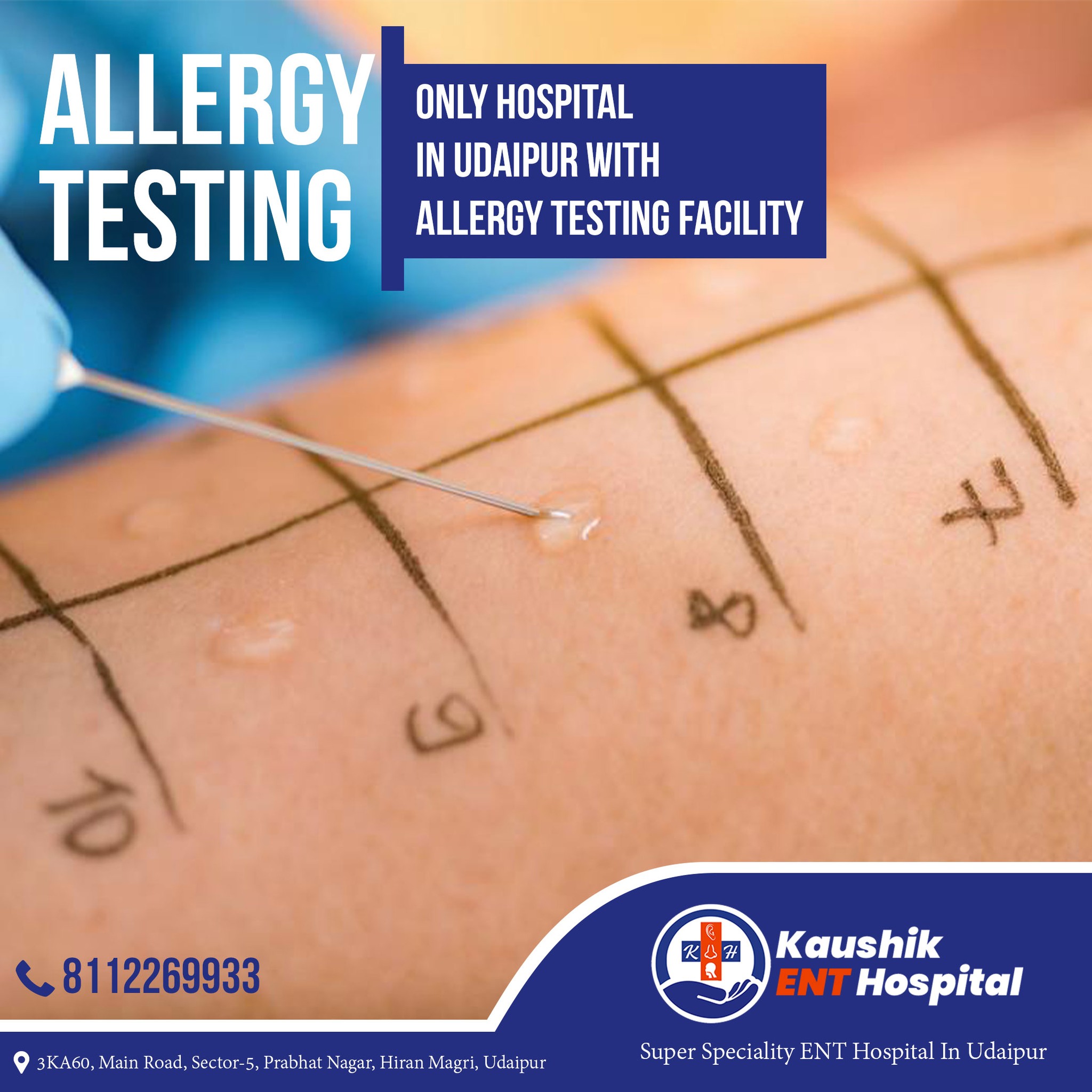Allergies are a common health issue that can lead to various uncomfortable symptoms, affecting your daily life. Whether you experience sneezing, itchy eyes, skin rashes, or severe reactions, understanding your allergies is crucial for effective management. If you are in Udaipur, Kaushik ENT Hospital provides thorough allergy testing services to identify specific allergens, helping you find relief and improve your quality of life.
What is Allergy Testing?
Allergy testing is a medical procedure designed to determine whether your body has an allergic reaction to certain substances, known as allergens. These can include pollen, dust mites, pet dander, mold, food, and insect stings. By identifying these triggers, healthcare providers can develop tailored treatment plans to manage and alleviate symptoms.
Types of Allergy Tests
At Kaushik ENT Hospital, a variety of allergy testing methods are employed, depending on your symptoms and medical history:
- Skin Prick Test:
- Procedure: This test involves placing small amounts of potential allergens on your skin, usually on your forearm or back, and pricking the skin’s surface.
- Reaction: If you are allergic, a small raised bump (wheal) will appear at the test site within 15-20 minutes.
- Advantages: Quick results and minimal discomfort make this test a common choice.
- Skin Intradermal Test:
- Procedure: For this test, a small amount of allergen is injected just below the skin’s surface.
- Reaction: Similar to the skin prick test, a reaction will indicate an allergy.
- When Used: This test is often used when skin prick tests yield inconclusive results, especially for insect venoms or certain medications.
- Blood Tests:
- Types: The most common blood tests include the specific IgE test and the RAST (Radioallergosorbent test).
- Procedure: A blood sample is drawn and analyzed to measure the immune system’s response to specific allergens.
- Advantages: Blood tests are beneficial for individuals with skin conditions that may interfere with skin tests and provide a more comprehensive view of multiple allergies.
- Patch Testing:
- Purpose: Primarily used for diagnosing contact dermatitis, this test identifies delayed allergic reactions.
- Procedure: Small patches containing allergens are applied to the skin and left in place for 48 hours.
- Reaction: After removing the patches, the skin is evaluated for reactions.
Benefits of Allergy Testing
- Accurate Diagnosis: Identifying specific allergens helps in managing symptoms effectively.
- Personalized Treatment Plans: Tailored strategies can include avoiding triggers, medications, or immunotherapy.
- Improved Quality of Life: Understanding your allergies can lead to better management, reducing the impact on daily activities.

The Importance of Allergy Testing
Allergy testing is a vital step in managing allergic conditions. Here are some key benefits:
- Accurate Diagnosis: By identifying specific allergens, patients can better understand what triggers their symptoms, allowing for more effective management strategies.
- Personalized Treatment Plans: With a clear understanding of allergens, healthcare providers can create tailored treatment plans that may include:
- Avoidance Strategies: Guidance on how to avoid known triggers.
- Medications: Recommendations for antihistamines, decongestants, or other medications to alleviate symptoms.
- Immunotherapy: For long-term relief, allergy shots or sublingual tablets can help desensitize the immune system to specific allergens over time.
- Improved Quality of Life: Managing allergies effectively can lead to significant improvements in daily life, reducing symptoms and enhancing overall well-being.
- Prevention of Severe Reactions: Understanding your allergies can help prevent potentially life-threatening reactions, especially for those with food or insect sting allergies.
What to Expect During Allergy Testing
If you choose to undergo allergy testing at Kaushik ENT Hospital, here’s what you can expect:
- Initial Consultation: You’ll have a detailed discussion with your doctor about your medical history, symptoms, and any previous allergic reactions.
- Testing Day: Most allergy tests are conducted in an outpatient setting. You may be asked to avoid certain medications, such as antihistamines, for several days before testing to ensure accurate results.
- Post-Test Evaluation: After the tests are conducted, your doctor will review the results with you, discuss any reactions, and explain the next steps for managing your allergies.
Why Choose Kaushik ENT Hospital for Allergy Testing and Treatment?
- Expert Care: Led by Dr. Shiv Shanker Kaushik, a highly experienced ENT specialist, the hospital offers accurate diagnoses and tailored treatment plans for allergies.
- Comprehensive Testing: The hospital provides various allergy testing methods, including skin prick tests, blood tests, and patch testing, ensuring thorough identification of allergens.
- Personalized Treatment: Each patient receives individualized care, including avoidance strategies, medications, and potential immunotherapy based on their specific allergens.
- State-of-the-Art Facilities: Equipped with modern diagnostic tools, Kaushik ENT Hospital ensures safe and efficient testing and treatment processes.
- Patient-Centric Approach: The hospital emphasizes patient education and involvement, fostering a supportive environment where patients can understand their condition and treatment options.
- Proven Results: With a strong track record of successful diagnoses and treatments, the hospital is recognized for helping patients improve their quality of life.
- Convenient Location: Situated in Udaipur, Kaushik ENT Hospital is easily accessible, making it a convenient choice for specialized allergy care.




Leave A Comment